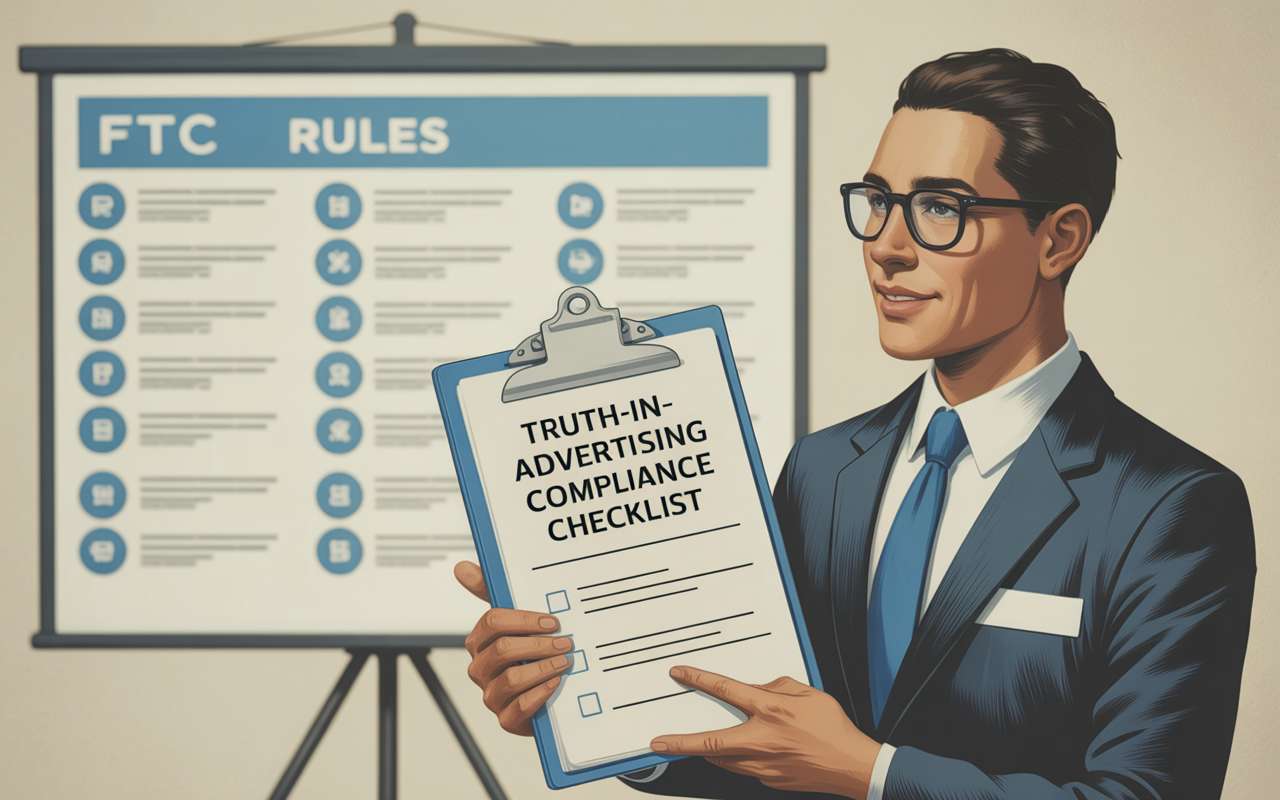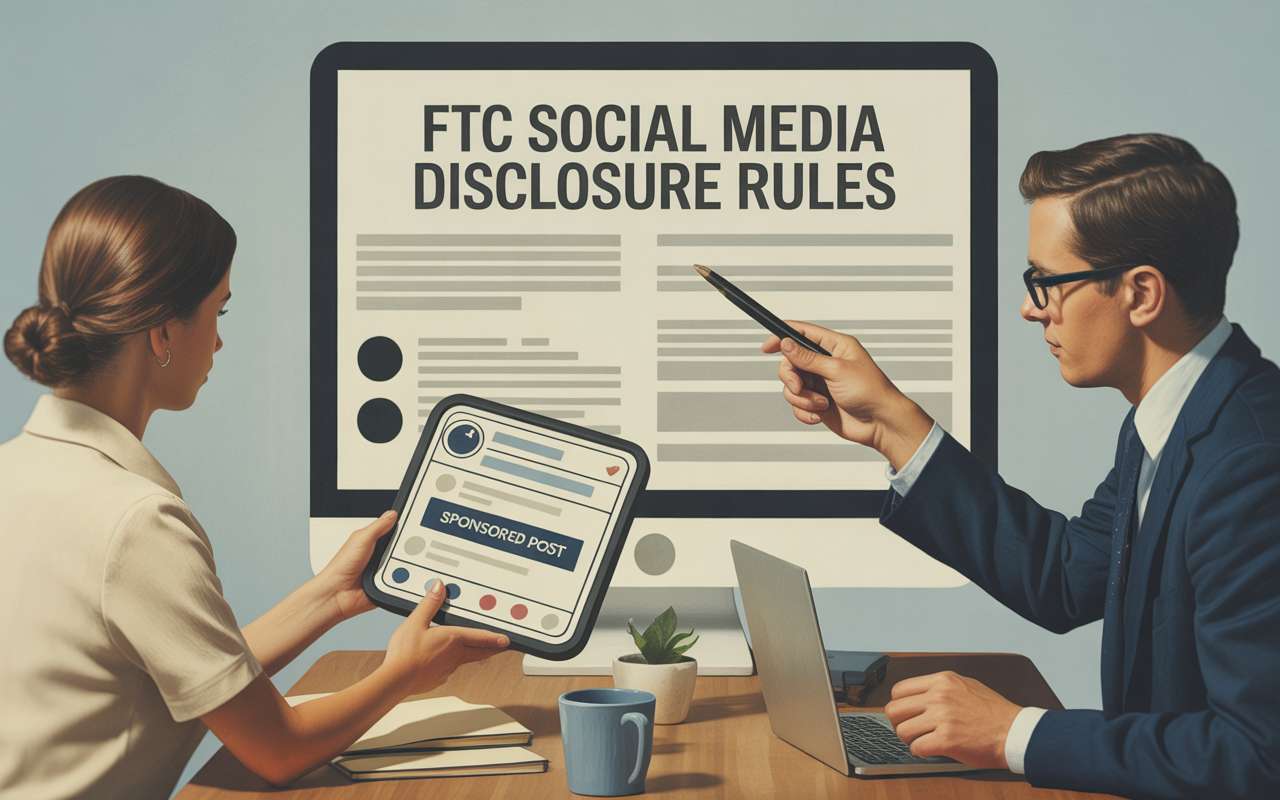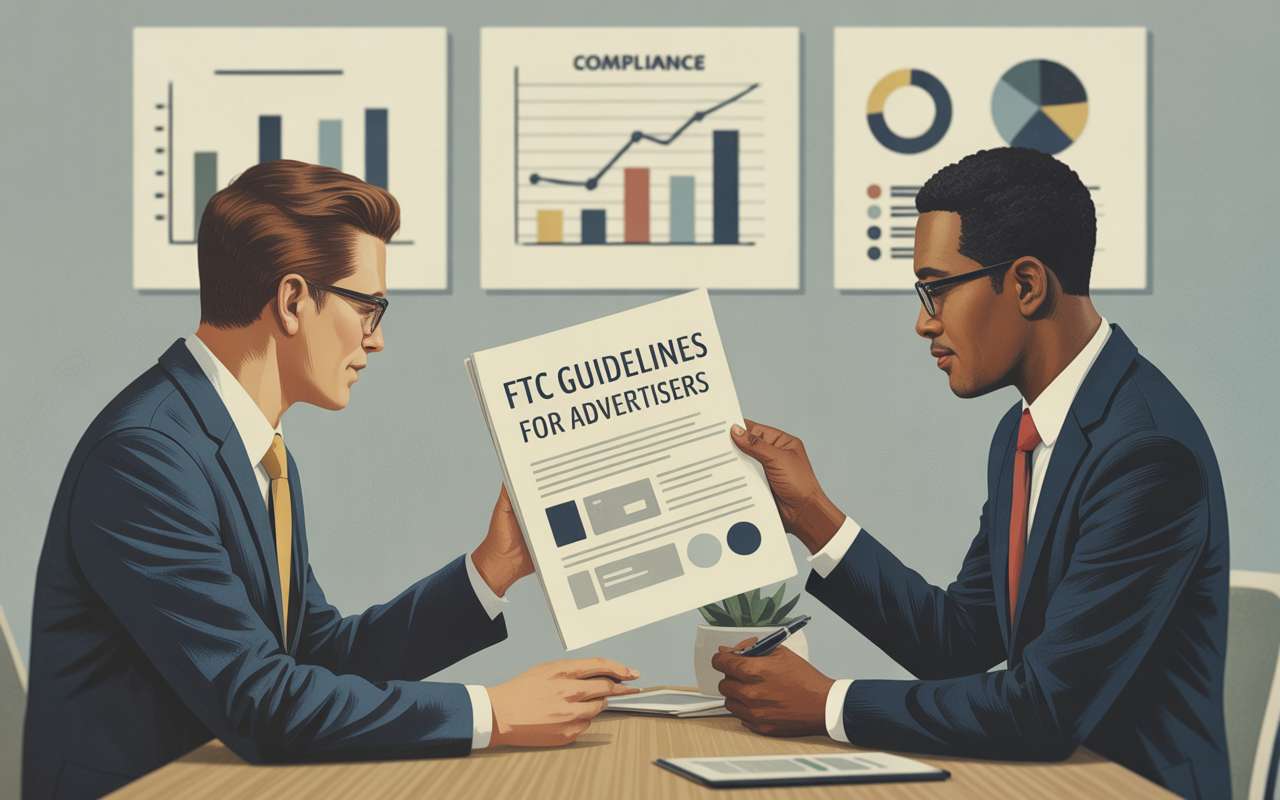In April 2023, the FTC warned almost 700 companies to back up their product claims or face penalties. With U.S. digital advertising spending projected to reach $309.3 billion in 2024, regulatory scrutiny has never been more intense.
20% of marketing materials reviewed by compliance firms in Q1 2024 were flagged for potential legal violations? That's a sobering thought for marketing teams everywhere.
We're seeing this firsthand at Luthor. Companies come to us frustrated because their creative teams feel hamstrung by compliance concerns, while their compliance teams are overwhelmed trying to review endless marketing materials. It's a tension that costs time, money, and sometimes leads to painful regulatory penalties.
But you don't have to choose between effective marketing and regulatory compliance. Let's dive into what you need to know about the FTC's marketing regulations and how to stay compliant without sacrificing creativity.
What are the key FTC regulations that govern advertising and marketing?
At the heart of U.S. marketing law is Section 5 of the FTC Act, which prohibits "unfair or deceptive acts or practices" in commerce. This broad mandate sets the foundation for truth-in-advertising standards across all industries.
But that's just the beginning. Here are several other important rules:
- The Telemarketing Sales Rule implements the National Do Not Call Registry
- The CAN-SPAM Act governs commercial email marketing
- COPPA restricts targeting children under 13
- The Endorsement Guides (updated in 2023) address social media and influencer marketing
- The Green Guides cover environmental marketing claims
All of these regulations boil down to one essential requirement: any business advertising in the U.S. must be fully aware of a framework of truthful advertising plus specific rules for different marketing channels.
What are FTC's truth-in-advertising requirements?

The FTC's principle is straightforward: ads must be truthful, not misleading, and evidence-based. This applies to all types of claims, whether explicit or implied, about your product's benefits, price, or any other material aspect.
Marketers need a reasonable basis for objective claims before advertising them. Since 1984, the FTC's advertising substantiation doctrine has required evidence for claims, especially for health, safety, or efficacy assertions.
For example, if you're marketing a health product, you need scientific proof, a claim that a supplement treats a condition might require at least one well-controlled human clinical trial as support.
Consumers deserve accurate, honest information, and businesses must be ready to substantiate what they claim.
How to comply with regulations against deceptive marketing claims?
Compliance with anti-deception rules comes down to one key practice: substantiation. You should ensure all claims have evidence before ads run. In the FTC's view, lacking support for claims is itself deceptive.
To avoid problems, implement a review process where factual claims (like "#1 in effectiveness") are vetted with data. Claims about health benefits require particularly rigorous proof, given the higher associated risks if something goes wrong.
It's also critical to avoid omissions that make true statements misleading, for instance, if an offer has important conditions, those must be disclosed prominently.
The FTC has recently taken an aggressive stance on unsubstantiated claims. In 2023, it sent Penalty Offense notices to around 670 companies (mostly health products), reminding them that making claims without evidence can lead to fines up to $50,120 per violation.
Federal Trade Commission guidelines for social media marketing

In mid-2023, the FTC revised its Endorsement Guides to address modern platforms, reinforcing that advertisers using social media are subject to the same truthful advertising laws as traditional media.
Practically, this means influencer posts, testimonials, and online reviews must reflect honest opinions and cannot be misleading. If an influencer has a material connection to a brand (payment, free product, etc.), the FTC expects a clear disclosure of that relationship.
The updated guides also warn against fake reviews or suppressing negative reviews, those are deceptive practices. According to the FTC's rules, an endorser must use the product and give honest opinions, and marketers shouldn't cherry-pick only positive testimonials if they're not representative.
How can businesses ensure their marketing practices are legally compliant?
Ensuring legal compliance requires a forward-thinking strategy. Successful companies build a marketing compliance program that includes training, clear policies, and regular oversight.
A good first step is educating your marketing team on truth-in-advertising law. Many firms develop checklists or approval processes for campaigns, before an ad goes live, legal or compliance officers review it for any red flags.
Data supports the value of such diligence. One industry survey found that while companies spent on average $5.5 million on compliance in 2022, those who fell afoul of the rules faced around $15 million in costs (fines, legal fees, etc.) on average.
Practical steps you can take include assigning a point person for marketing compliance, conducting regular audits, and keeping updated on regulatory changes. It's also wise to establish a protocol for addressing any complaints or inquiries.
Creating compliant advertising disclosures that protect your business

Well-crafted disclosures can clarify claims and prevent consumer misunderstanding, but to be effective, they must be clear, conspicuous, and properly placed.
The FTC's disclosures guide states that on digital platforms, you should use plain language and a format that consumers notice. The goal is that necessary information is communicated effectively so that the overall impression of the ad is truthful.
Some common scenarios requiring disclosures include:
- Additional fees or conditions on an offer
- Unusual material connections (e.g., "employee testimonial")
- Results not typical ("individual results may vary")
The format matters too, a disclosure should be easy to read, and for video or audio ads, it should be spoken clearly. Regulators have flagged that simply having an asterisk and tiny footnote is not sufficient.
In fact, "missing or hard-to-find disclosures" are among the top compliance issues, especially on websites and social media.
To protect your business, think of disclosures as an integral part of the ad creative, not an afterthought. When in doubt, making the disclosure more prominent is the safer route.
Legal requirements for marketing claims and offers
Beyond general rules, specific legal requirements apply to certain kinds of claims and promotional offers. "Free" offers and other promotional phrases are a common pitfall. If you advertise something as "free," it must truly have no strings attached aside from those clearly disclosed.
Regulators often target misuse of words like "free," "risk-free trial," or "guaranteed." Recent enforcement trends show scrutiny of misleading "free" claims that weren't delivered as advertised.
Price and savings claims also have legal guidelines. If you mentioned a "50% off" discount, the reference price should be genuine. Bait-and-switch tactics are expressly forbidden as unfair or deceptive.
When making performance claims ("lasts 12 hours," "fastest on the market"), ensure you meet any measurable criteria you state. Offers involving satisfaction guarantees or warranties must comply with applicable laws.
If your marketing involves negative options or subscription plans (e.g., free trial that auto-enrolls customers), note that the FTC updated rules on those as well. In March 2023, the FTC proposed a new "Click-to-Cancel" rule to make cancellations easier.
The bottom line: say what you mean, and deliver what you promise.
Developing a regulatory compliance framework for your marketing team
Building a compliance framework means embedding legal awareness into the marketing process. One way is establishing written guidelines that translate laws into practical do's and don'ts for your team.
Another key component is creating a review and approval workflow. Smaller businesses might use a simple checklist; larger organizations often have a formal Marketing Compliance Officer who signs off on ads.
A robust framework also accounts for record-keeping. Keep documentation of claim substantiation on file. If you're ever challenged, being able to quickly show your evidence is invaluable.
In regulated sectors like finance or healthcare, compliance frameworks may need to be more elaborate. But even tech startups benefit from some structure. Notably, 93% of fintech firms in one 2023 survey said they struggle to meet compliance requirements, and over 60% had paid fines in the past year.
Don't overlook the tone from the top. If management emphasizes ethical advertising and backs the compliance team's authority, the marketing staff will take it seriously.
What legal guidance exists for digital marketing and electronic communications?
Digital marketing is governed by a mix of FTC rules and other laws. A primary rule is that the same truth-in-advertising standards apply online as offline.
The FTC's ".com Disclosures" guide provides best practices on how to display disclosures on websites and mobile apps.
For email and text messaging, specific laws come into play. The CAN-SPAM Act sets requirements for commercial emails: you must not use false header info, avoid deceptive subject lines, identify the message as an advertisement, include a valid physical address, and honor opt-out requests promptly.
Each individual email that violates CAN-SPAM can incur penalties up to $53,088 per email.
The FCC oversees the Telephone Consumer Protection Act (TCPA), which covers telemarketing calls and text messages. Under the TCPA, businesses generally need prior express consent to send marketing texts or make auto-dialed calls. Violations can lead to $500 to $1,500 damages per unsolicited call or text.
If you're reaching customers through email, SMS, or other direct electronic means, obtain proper consent, provide clear opt-outs, and keep records of compliance.
CAN-SPAM Act requirements for email marketing

To know their ways around CAN-SPAM compliance, marketers should internalize its main rules:
- No misleading headers or senders: The "From," "To," and reply-to addresses must accurately identify who sent the message.
- No deceptive subject lines: The subject line must reflect the content of the email.
- Identify the message as an ad: Somewhere in the email, clearly disclose that it's an advertisement.
- Include a physical postal address: Every marketing email must list a valid address.
- Provide a clear opt-out method: Emails must have an easy way for recipients to unsubscribe, which must be processed within 10 business days.
Failure to follow these rules can lead to severe penalties. In 2024, a California company agreed to pay a $2.95 million penalty, the largest ever for a CAN-SPAM case, after sending unsolicited emails without opt-out options or physical addresses.
To stay safe, use reputable email marketing platforms with built-in compliance tools, maintain updated suppression lists, and monitor your campaigns.
Privacy law compliance across digital advertising platforms

In today's data-driven marketing, privacy compliance is a major facet of advertising law. Digital ad platforms rely on user data for targeting, but laws increasingly give consumers rights over that data.
In the U.S., five states (including California, Colorado, and Virginia) have comprehensive privacy statutes that require businesses to let consumers opt out of targeted advertising or the "sale" of their data.
For example, under the California Consumer Privacy Act (CCPA) and its successor the CPRA, a consumer can click a "Do Not Sell or Share My Info" link. California regulators have already enforced this: cosmetics retailer Sephora paid $1.2 million in 2022 to settle allegations it failed to disclose data sharing with ad networks.
The FTC has also taken action against "dark patterns", interfaces that trick users into giving consent or personal information. In 2023, the FTC settled with a tech firm over charges that its website's confusing design led users to sign up for unwanted subscriptions.
Internationally, privacy laws like the EU's General Data Protection Regulation (GDPR) affect global advertising. GDPR requires a lawful basis to use personal data for targeted ads, and violations yield enormous fines. In early 2023, Ireland's Data Protection Commission fined Meta €390 million over Facebook and Instagram targeted ad practices.
To comply across platforms, provide clear privacy notices, obtain consent for tracking where required, honor opt-out signals, and keep data secure.
Legal regulations for website communications and advertisements
Everything on your website is subject to the same truthfulness standard as any ad. If you make claims on your site, you should have evidence just as you would in a paid advertisement.
Businesses should not tamper with or selectively publish reviews in a misleading way. The Consumer Review Fairness Act makes it illegal to prohibit negative reviews.
Certain legal requirements specifically apply to websites: one is the mandate (in some jurisdictions) to have a privacy policy. California's Online Privacy Protection Act requires commercial websites that collect personally identifiable info from Californians to post a conspicuous policy explaining what data they collect and how it's used.
Another consideration is accessibility and disclosures on websites. Websites should also avoid "dark patterns", design tricks that mislead users. In 2023, the FTC notably fined an online company for using confusing interfaces that trapped users in recurring payments.
Treat your website as a continuously published advertisement that must meet legal standards. Regularly audit content for accuracy and keep required notices prominent and updated.
What are the consequences of violating marketing regulations?
Violating advertising laws can lead to serious consequences, legal, financial, and reputational. The FTC can seek remedies including cease-and-desist orders, consumer redress, disgorgement of profits, and civil penalties.
FTC cases often settle with significant payments: in 2023, FTC enforcement actions returned over $324 million to consumers. Individual cases can be very costly, the FTC fined one company $2 million in 2024 for false "Made in USA" claims.
Beyond federal action, state authorities can act too. There have been multi-state settlements where companies paid millions, for example, a $141 million settlement by a tech company over allegedly deceptive "free" service advertising.
Private litigation is another risk: the volume is rising, 500+ false advertising class cases were filed in one year in California federal courts alone.
Then there's business disruption: being under investigation consumes management time and legal fees. You might have to pull ads immediately and enter into long compliance monitoring programs.
Finally, the damage to customer trust and brand reputation can be irreparable.
FTC enforcement actions and penalties for unfair or deceptive practices

The FTC actively enforces prohibitions on unfair or deceptive marketing. In a single quarter (Q2 2024), federal and state agencies finalized 12 enforcement actions totaling $71 million in fines.
Under the Made in USA Labeling Rule, the FTC secured a $2 million penalty (its largest ever in such a case) against a company for misleading origin claims. And under the Telemarketing Sales Rule, the FTC and others announced action on billions of illegal calls in the "largest telemarketing crackdown in U.S. history."
When the FTC labels a practice unfair or deceptive, penalties can include money and injunctive relief. The company might be barred from certain marketing tactics altogether.
The FTC is increasing its use of civil penalty authority via specific rules or statutes and coming up with new rules to outlaw common deceptive practices. The agency's message is clear: unlawful conduct is not profitable for companies.
For businesses, pay attention to FTC press releases and policy statements. They often telegraph enforcement priorities.
How regulatory violations can damage customer trust and brand reputation?
Regulatory violations don't just hit the balance sheet; they strike at customer relationships and brand equity. Modern consumers are increasingly values-driven, being exposed for deception can break the bond of trust that took years to build.
When an enforcement action becomes public, news headlines and social media spread the story virally. Such publicity plants doubt in consumers' minds about the company's integrity. Advertising law violations "hit the bottom line" through fines and lost consumer trust.
Trust issues also extend to business partners and investors. Retailers might pull your products off shelves if your advertising is under legal fire. Online platforms may suspend your advertising accounts. Investors dislike seeing regulatory issues because it implies risk.
Moreover, internal brand identity takes a hit. Employees proud to work for an ethical brand may feel demoralized if they see their company named in a deception case.
Customer trust is an invaluable asset, and deceptive marketing squanders it. The cost of acquiring new customers is high; keeping existing ones loyal requires consistent positive experiences, which include feeling that the company is truthful.
Final Thoughts: Balancing Creativity with Compliance
Let's be honest, marketing compliance can feel like a burden when you're trying to create compelling campaigns that drive results. But as we've seen, the cost of non-compliance far outweighs the investment in doing things right.
What if you could automate the repetitive parts of compliance review, so your marketing and compliance teams could focus on strategic work instead? That's where Luthor comes in.
We're an AI-driven compliance platform designed specifically for regulated businesses. We help marketing and compliance teams ensure that all public-facing content, websites, emails, social media, and ads, meets regulatory requirements.
Luthor continuously scans your marketing content across channels to catch potential regulatory issues before they become problems. Our AI engine updates in real-time based on SEC and FINRA guidelines, flagging non-compliant phrases or claims and providing recommended fixes.
This doesn't replace your compliance teams, it multiplies their effectiveness. By streamlining and standardizing the review process, you maintain compliance more efficiently while still delivering impactful marketing.
Ready to reduce risk, effort, and time tackling marketing compliance at scale? Request a demo of Luthor today and see how we can help your teams work together more effectively while keeping your brand safe from regulatory action.




